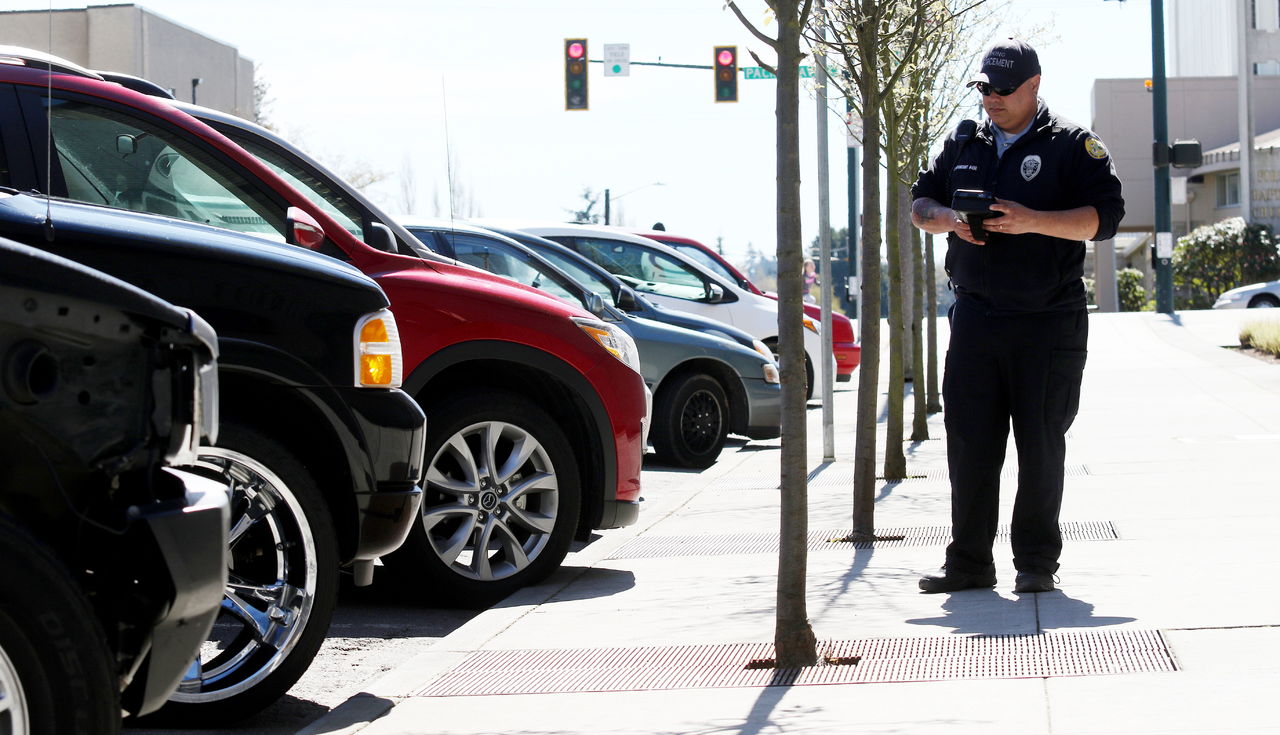EVERETT — Consultants who conducted a study last fall of parking in downtown Everett said that while the level of parking congestion remains roughly the same as it was eight years ago, the city needs to beef up enforcement.
The reason: A large number of people are routinely violating the city’s parking restrictions, either by overstaying the time limits on spots, or by moving their vehicles to other on-street spots to avoid being ticketed, a practice called “reparking” that some downtown employees do to avoid tickets or paying for an off-street space.
All told, 740 people, or 13 percent of drivers in the downtown area on a typical weekday, violated city ordinances either by reparking or staying in timed parking stalls longer than four hours — another possible sign of an employee. Those same people use 40 percent of the on-street parking availability during the day.
Most of the city’s on-street spaces are limited to 90 minutes, and a smaller number have limits of two hours, one hour or 30 minutes. For all those categories, however, drivers park their cars there for longer than the allowed time. The average vehicle parks for one hour and 52 minutes during the mid-day peak period.
“That really is the big problem we have in downtown. And why? Because enforcement is really inconsistent,” said Clark Worth, a consultant hired by the city to conduct the study.
Judy Matheson sees the problem all the time.
Matheson, owner of J. Matheson Gifts, Kitchen &Gourmet at 2615 Colby Ave., said she has seen local employees repark on the street.
Some of Matheson’s customers come to the shop from out of town and can’t find a parking spot, so they leave, she said.
Matheson said she pays her own employees to park in an off-street lot to avoid contributing to the problem, but said there still needs to be more enforcement.
“They don’t come often enough, as far as I’m concerned,” Matheson said.
There aren’t any limits on parking on the weekends, and if events are being held at the nearby Everett Performing Arts Center, Everett High School — or it’s just a busy day at the tavern down the block — the street fills up for hours, Matheson said.
The parking study is a follow-up to one the city conducted in 2007 in response to the perception that it was just getting too hard to find a parking place in downtown Everett.
City engineer Ryan Sass told the Everett City Council on Wednesday that the original study was done to see if the city needed to move toward metered parking to alleviate congestion.
Downtown businesses suffered when the economy tanked — along with a few devastating fires — which eased the parking problems.
“Now we’ve returned to a period of sustained growth,” Sass said. Since then, 650 new residential units were added to the downtown area, so the city wanted to find out if they were contributing to the problem.
For the study, the city hired the same consultants and used the exact same methodology as it did in 2007. At its core was a survey of all 1,842 on-street parking spots every hour over a 12-hour period on Oct. 12, 2015, plus a survey of about 6,378 stalls in the three large parking garages downtown, about one-third of the off-street total.
The surveyors recorded license plate numbers in order to track who was re-parking or overstaying the parking limit.
“We knew exactly who parked for how long where,” said Rick Williams, another of the city’s consultants.
One recipient of the parking enforcers’ ire is Mufid Algailany, who admitted to receiving multiple tickets over the years, including three or four in one month in 2015.
Algailany, sitting in Silver Cup Coffee in the Key Bank Tower on Thursday, said he parks for a long time downtown because he has to drop off and pick up his wife from work. His wife has Parkinson’s disease and he has to park right outside her building to help her.
He doesn’t mind getting ticketed — “I’ll be responsible,” he said — as much as he does the compounding fines for overstaying, multiple tickets or missing a deadline.
Algailany said he would prefer the city require the owners of multistory buildings to provide off-street parking for the public.
“This building should provide parking for everyone,” Algailany said, indicating the building he was sitting in.
The city’s study showed that parking congestion is up almost to the level it was in 2007, with a peak occupancy rate of 65 percent of all stalls.
That’s still less than the 69.5 percent occupancy recorded in 2007, and well below 85 percent, the threshold above which an urban area is considered to be truly constrained, provoking stress, angst and more traffic as people drive around looking for a parking place.
The study also showed that the new housing units, which were built with a requirement to provide some off-street spaces, had not contributed to congestion on the streets.
The most congested hours are between 11 a.m.-1 p.m., and the sections of Colby and Hoyt Avenues between Pacific and Everett Avenues were the most consistently congested stretches of the city.
The consultants recommended, as a first step, that the city hire more enforcement officers, standardize most of the rest of the on-street spaces to 90-minute time limits, update the technology used by enforcement officers and appoint a parking advisory committee to oversee the city’s parking operations.
A policy recommendation is expected to be drawn up over the next several months, Sass said.
Hiring more officers will be an important first step. The city only has one enforcement officer dedicated to the downtown core, Sass said.
“If you really want to bend the curve on this, then you’ll need substantially more enforcement,” he said.
Chris Winters: 425-374-4165; cwinters@heraldnet.com. Twitter: @Chris_At_Herald.
Talk to us
> Give us your news tips.
> Send us a letter to the editor.
> More Herald contact information.

























